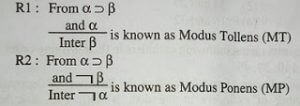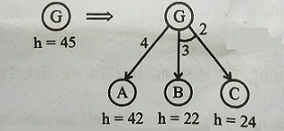(A) Maskable interrupt
(B) Periodic interrupt
(C) Division by zero
(D) Synchronous interrupt
2. Which of the following is incorrect for virtual memory?
(A) Large programs can be written
(B) More I/O is required
(C) More addressable memory available
(D) Faster and easy swapping of process
Solution:
Virtual memory is a feature of an operating system (OS) that allows a computer to compensate for shortages of physical memory by temporarily transferring pages of data from random access memory (RAM) to disk storage.
Ans: (B)
- The general configuration of the microprogrammed control unit is given below:
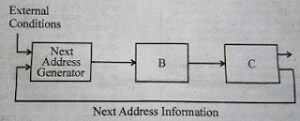
What are blocks B and C in the diagram respectively?
(A) Block address register and cache memory
(B) Control address register and control memory
(C) Branch register and cache memory
(D) Control address register and random access memory
Ans: (B)
Explanation:
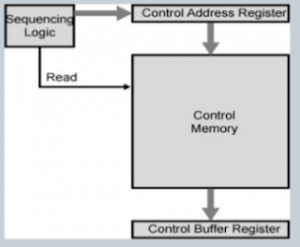
- Match the following:
Addressing Mode Location of operand
- Implied i. Registers which are in CPU
- Immediate ii. Register specifies the address
of the operand 3. Register iii. Specified in the register 4. Register Indirect iv. Specified implicitly in the
definition of instruction
Codes:
a b c d
(A) iv iii i ii
(B) iv i iii ii
(C) iv ii i iii
(D) iv iii ii i
Ans: (A)
- In 8085 microprocessor, the digit 5 indicates that the microprocessor needs
(A) -5 volts, +5 volts supply
(B) +5 volts supply only
(C) -5 volts supply only
(D) 5 MHz clock Solution: The “5” in the part number highlighted the fact that the 8085 uses a single +5-volt (V) power supply by using depletion-mode transistors, rather than requiring the +5 V, −5 V and +12 V supplies needed by the 8080.
Ans: (B)
- In 8085, which of the following performs: load register pair immediate operation?
(A) LDAX rp
(B) LHLD addr
(C) LXI rp, data
(D) INX rp
Ans: (C)
- Consider following schedules involving two transactions:
S1: r1(X); r1(Y); r2(X); r2(Y); w2(Y); w1(X)
S2: r1(X); r2(X); r2(Y); w2(Y); r1(Y); w1(X)
Which of the following statement is true?
(1) Both S1 and S2 are conflict serializable.
(2) S1 is conflict serializable and S2 is not conflict serializable.
(3) S1 is not conflict serializable and S2 is conflict serializable.
(4) Both S1 and S2 are not conflict serializable.
Solution: Since S1 contains a cycle, it is not a conflict serializable schedule, but S2 is a conflict serializable schedule.
Ans: (C)
- Which one is correct w.r.t. RDBMS?
(A) primary key ⊆ super key ⊆ candidate key
(B) primary key ⊆ candidate key ⊆ super key
(C) super key ⊆ candidate key ⊆ primary key
(D) super key ⊆ primary key ⊆ candidate key
Solution: A relation has one or more candidate keys and one candidate key can be selected as a primary key for the relation. One or more attributes which can define all the other attributes in a relation is called a super key. Hence, primary key is a subset of candidate key and candidate key is a subset of super key.
Ans: (B)
- Let pk(R) denotes primary key of relation R. A many-to-one relationship that exists between two relations R1 and R2 can be expressed as follows:
(A) pk(R2)→pk(R1)
(B) pk(R1)→pk(R2)
(C) pk(R2)→R1∩R2
(D) pk(R1)→R1∩R2
Ans: (C)
Solution: An arrow mark from A to B defines that there exists a many to one relationship between A to B. In case of Many To One, we need to consider only the primary keys of relation with many attributes.
- For a database relation R(A,B,C,D) where the domains of A,B,C and D include only atomic values, only the following functional dependencies and those that can be inferred from them are:
A→C
B→D
The relation R is in …………….
(A) First normal form but not in second normal form
(B) Both in first normal form as well as in second normal form
(C) Second normal form but not in third normal form
(D) Both in second normal form as well as in third normal form Ans: (A) Solution: In the above relation R, the candidate key is AB, so in the first functional dependency there exists a Partial Dependency. The second FD also shows partial dependency, so the relation cannot be in 2NF.
- Consider the following relation:
Works (emp_name, company_name, salary)
Here, emp_name is primary key.
Consider the following SQL query
Select emp_name
From Works T
where salary>(select avg (salary)
from Works S
where T.company_name=Company_name)
The above query is for following:
(A) Find the highest paid employee who earns more than the average salary of all employees of his company.
(B) Find the highest paid employee who earns more than the average salary of all the employees of all the companies.
(C) Find all employees who earn more than the average salary of all employees of all the companies.
(D) Find all employees who earn more than the average salary of all employees of their company.
Ans: (D)
Solution: In the inner query, we are selecting the average salary of all employees of the company, whereas outer query is selecting all the employees whose salary is greater than the previously computed average salary.
12. If the following sequence of keys is inserted in a B+ tree with K(=3) pointers:
8, 5, 1, 7, 3, 12, 9, 6
Which of the following shall be correct B+ tree?
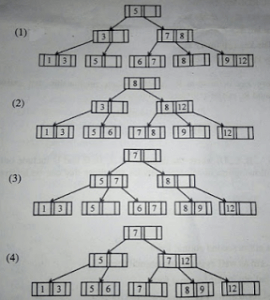
Solution: After inserting all the elements, we’ll get 5 as the root and 3 will be left of 5 and 7,8 will be right of 5.
Ans: (A)
- 13. Which of the following statement(s) is/are correct?
(A) Persistence is the term used to describe the duration of phosphorescence.
(B) The control electrode is used to turn the electron beam on and off.
(C) The electron gun creates a source of electrons which are focussed into a narrow beam directed at the face of CRT.
(D) All of the above. Solution: Different kinds of phosphor are available for use in a CRT. Besides color, a major difference between phosphors is their persistence: how long they continue to emit light ( that is, have excited electrons returning to the ground state ) after the CRTbeam is removed.
Ans: (D)
- A segment is any object described by GKS commands and data that start with CREATE SEGMENT and Terminates with CLOSE SEGMENT command. What functions can be performed on these segments?
(A) Translation and Rotation
(B) Panning and Zooming
(C) Scaling and Shearing
(D) Translation, Rotation, Panning and Zooming Ans: (D)
15. Match the following: a. Glass i. Contains liquid crystal and serves
as a bonding surface for a conductive
coating. b. Conductive coating ii. Acts as a conductor so that a voltage
can be applied across the liquid crystal. c. Liquid Crystal iii. A substance which will polarize light
when a voltage is applied to it. d. Polarized film iv. A transparent sheet that polarizes light.
Codes:
a b c d
(A) i ii iii iv
(B) i iii ii iv
(C) iv iii ii i
(D) iv ii i iii
Ans: (A)
- Below are the few steps given for scan-converting a circle using Bresenham’s Algorithm. Which of the given steps is not correct?
(1) Compute d = 3 – 2r (where r is radius)
(2) Stop if x > y
(3) If d<0, then d=4x+6 and x=x+1
(4) If d≥0,then d=4 *(x-y)+10, x=x+1 and y=y+1Solution:
Algorithm
Step 1 − Get the coordinates of the center of the circle and radius, and store them in x, y, and R respectively. Set P=0 and Q=R.
Step 2 − Set decision parameter D = 3 – 2R.
Step 3 − Repeat through step-8 while X < Y.
Step 4 − Call Draw Circle (X, Y, P, Q).
Step 5 − Increment the value of P.
Step 6 − If D < 0 then D = D + 4x + 6.
Step 7 − Else Set Y = Y + 1, D = D + 4(X-Y) + 10.
Step 8 − Call Draw Circle (X, Y, P, Q).
Ans: (D)
- Which of the following is/are side effects of scan conversion?
a. Aliasing
b. Unequal intensity of diagonal lines
c. Over striking in photographic applications
d. Local or Global aliasing
(1) a and b
(2) a, b and c
(3) a, c and d
(4) a, b, c and d
Solution: All 4 are the side effects of scan conversion.
Ans: (4)
18. Consider a line AB with A = (0,0) and B = (8, 4). Apply a simple DDA algorithm and compute the first four plots on this line.
(A) [(0, 0), (1, 1), (2, 1), (3, 2)]
(B) [(0, 0), (1, 1.5), (2, 2), (3, 3)]
(C) [(0, 0), (1, 1), (2, 2.5), (3, 3)]
(D) [(0, 0), (1, 2), (2, 2), (3, 2)]
Solution:
DDA Algorithm
Digital Differential Analyzer (DDA) algorithm is the simple line generation algorithm which is explained step by step here.
Step 1 − Get the input of two end points (X0,Y0) and (X1,Y1).
Step 2 − Calculate the difference between two end points.
dx = X1 – X0 dy = Y1 – Y0 Step 3 − Based on the calculated difference in step-2, you need to identify the number of steps to put pixel. If dx > dy, then you need more steps in x coordinate; otherwise in y coordinate.
if (absolute(dx) > absolute(dy)) Steps = absolute(dx); else Steps = absolute(dy);
Step 4 − Calculate the increment in x coordinate and y coordinate.
Xincrement = dx / (float) steps; Yincrement = dy / (float) steps;
Step 5 − Put the pixel by successfully incrementing x and y coordinates accordingly and complete the drawing of the line.
for(int v=0; v < Steps; v++) { x = x + Xincrement; y = y + Yincrement; putpixel(Round(x), Round(y)); }
Ans: (A)
- Which of the following are not regular?
(A) Strings of even number of a’s.
(B) Strings of a’s, whose length is a prime number.
(C) Set of all palindromes made up of a’s and b’s.
(D) Strings of a’s whose length is a perfect square.(1) (A) and (B) only
(2) (A), (B) and (C) only
(3) (B), (C) and (D) only
(4) (B) and (D) only Solution: Language which contains strings of even length of a’s is a regular language. Apart from that, no other language given in options is a regular one, because they require computations.
Ans: (3)
20. Consider the languages L1 = ϕ, and L2 = {1}. Which one of the following represents
L1* U L2* L1* ?
(1) {ε}
(2) {ε,1}
(3) ϕ
(4) 1*
Solution: L1* = {ε}
L2* = 1*
L1* U L2* L1* = 1*
Concatenation has higher priority than Union.
Ans: (D)
- Given the following statements :
(A) A class of languages that is closed under union and complimentation has to be closed under intersection.
(B) A class of languages that is closed under union and intersection has to be closed under complimentation.
Which of the following options is correct?
(1) Both (A) and (B) are false.
(2) Both (A) and (B) are true.
(3) (A) is true, (B) is false.
(4) (A) is false, (B) is true.
Answer: 3
- Let G = (V,T,S,P) be a context-free grammar such that every one of its productions is of the form A→v, with |v| = K>1. The derivation tree for any W ϵ L(G) has a height h such that
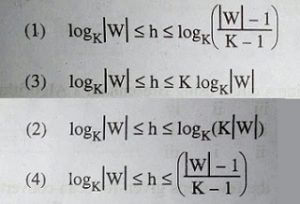
Answer: 4
- Given the following two languages:
L1 = {anbn|n≥0, n≠100}
L2 = {w ϵ {a,b,c}*| na(w) = nb(w) = nc(w)}
Which of the following options is correct?
(1) Both L1 and L2 are not context free language.
(2) Both L1 and L2 are context free language.
(3) L1 is context free language, L2 is not context free language.
(4) L1 is not context free language, L2 is context free language.
Answer: 3
- A recursive function h, is defined as follows:
h(m)=k, if m=0
= 1, if m=1
= 2h(m-1) + 4h(m-2), if m≥2
If the value of h(4) is 88 then the value of k is:
(1) 0
(2) 1
(3) 2
(4) -1
Answer: 3
- Suppose there are n stations in a slotted LAN. Each station attempts to transmit with a probability P in each time slot. The probability that only one station transmits in a given slot is ………………
(1) nP(1-P)n-1
(2) nP
(3) P(1-P)n-1
(4) nP(1-P)n-1
Answer: 1
- Station A uses 32 byte packets to transmit messages to station B using sliding window protocol. The round trip delay between A and B is 40 milli seconds and the bottleneck bandwidth on the path between A and B is 64 kbps. The optimal window size of A is
(1) 20
(2) 10
(3) 30
(4) 40
Answer: 2
- Let G(x) be generator polynomial used for CRC checking. The condition that should be satisfied by G(x) to correct odd numbered error bits, will be:
(1) (1+x) is factor of G(x)
(2) (1-x) is factor of G(x)
(3) (1+x2) is factor of G(x)
(4) x is factor of G(x)
Answer: 1
- In a packet switching network, if the message size is 48 bytes and each packet contains a header of 3 bytes. If 24 packets are required to transmit the message, the packet size is …………….
(1) 2 bytes
(2) 1 byte
(3) 4 bytes
(4) 5 bytes
Answer: 4
- In RSA public key cryptosystem suppose n=p*q where p and q are primes. (e,n) and (d,n) are public and private keys respectively. Let M be an integer such that 0<M<n and ɸ(n)=(p-1)(q-1).
Which of the following equations represent RSA public key cryptosystem?
- C≡Me (mod n), M≡(C)d(mod n)
- ed≡1(mod n)
III. ed≡(mod ɸ(n))
- C≡Me (mod ɸn), M≡Cd(mod ɸn)
Codes:
(1) I and II
(2) I and III
(3) II and III
(4) I and IV
Answer: 2
- A node X on a 10 Mbps network is regulated by a token bucket. The token bucket is filled at a rate of 2 Mbps. Token bucket is initially filled with 16 megabits. The maximum
duration taken by X to transmit at full rate of 10 Mbps is ………… secs.
(1) 1
(2) 2
(3) 3
(4) 4
Answer: 2
- The asymptotic upper bound solution of the recurrence relation given by
T(n)= 2T(n/2)+n/log n is:
(1) O(n2)
(2) O(n log n)
(3) O(n log log n)
(4) O(log log n)
Answer: 3
- Any decision tree that sorts n elements has height …………..
(1) Ω(log n)
(2) Ω(n)
(3) Ω(n log n)
(4) Ω(n2)
Answer: 3
- Red-black trees are one of many Search tree schemes that are “balanced” in order to guarantee that basic dynamic-set operations take …………. time in the worst case.
(1) O(1)
(2) O(log n)
(3) O(n)
(4) O(n log n)
Answer: 2
- The minimum number of scalar multiplication required, for parenthesization of a matrix-chain product whose sequence of dimensions for four matrices is <5,10,3,12,5> is
(1) 630
(2) 580
(3) 480
(4) 405
Answer: 4
- Dijkstra’s algorithm is based on
(1) Divide and conquer paradigm
(2) Dynamic Programming
(3) Greedy Approach
(4) Backtracking paradigm
Answer: 3
- Match the following with respect to algorithm paradigms:
List-I List-II
- Merge sort i. Dynamic Programming
- Huffman coding ii. Greedy approach
- Optimal polygon triangulation iii. Divide and conquer
- Subset sum problem iv. Back tracking
Codes:
a b c d
(1) iii i ii iv
(2) ii i iv iii
(3) ii i iii iv
(4) iii ii i iv
Answer: 4
- Abstraction and encapsulation are fundamental principles that underlie the object oriented approach to software development. What can you say about the following two statements? I. Abstraction allows us to focus on what something does without considering the complexities of how it works. II.Encapsulation allows us to consider complex ideas while ignoring irrelevant detail that would confuse us.
(1) Neither I nor II is correct.
(2) Both I and II are correct.
(3) Only II is correct.
(4) Only I is correct.
Answer: 1
- Given the array of integers ‘array’ shown below:
![]()
What is the output of the following JAVA statements?
int [ ] p = new int [10];
int [ ] q = new int [10];
for (int k = 0; k < 10; k ++)
p[k] = array [k];
q = p;
p[4] = 20;
System.out.println(array [4] + “:” + q[4]);
(1) 20:20
(2) 18:18
(3) 18:20
(4) 20:18
Answer: 3
- Consider the following JAVA program:
public class First {
public static int CBSE (int x) {
if (x < 100) x = CBSE (x +10);
return (x – 1);
}
public static void main (String[] args){
System.out.print(First.CBSE(60));
}
}
What does this program print?
(1) 59
(2) 95
(3) 69
(4) 99
Answer: 2
- Which of the following statement(s) with regard to an abstract class in JAVA is/are TRUE?
- An abstract class is one that is not used to create objects.
- An abstract class is designed only to act as a base class to be inherited by other classes.
(1) Only l
(2) Only II
(3) Neither I nor II
(4) Both l and II
Answer: 4
- Which of the following HTML code will affect the vertical alignment of the table content?
(A) <td style = “vertical-align : middle”>Text Here</td>
(B) <td valign = “centre”>Text Here</td>
(C) <td style = “text-align : center”>Text Here</td>
(D) <td align = “middle”>Text Here</td>
Ans: (B)
- What can you say about the following statements?
I. XML tags are case-insensitive.
II. In JavaScript, identifier names are case-sensitive.
III. Cascading Style Sheets (CSS) cannot be used with XML.
IV. All well-formed XML documents must contain a document type definition.
(A) only I and II are false.
(B) only III and IV are false.
(C) only I and III are false.
(D) only II and IV are false.Ans: (C)
- Which of the following statement(s) is/are TRUE with regard to software testing?
I. Regression testing technique ensures that the software product runs correctly after the changes during maintenance.
II. Equivalence partitioning is a white-box testing technique that divides the input domain of a program into classes of data from which test cases can be derived.
(A) only I
(B) only II
(C) both I and II
(D) neither I nor IISolution: Equivalence classpartioning is a Black-Box testig technique.
Ans: (A)
44. Which of the following are facts about a top-down software testing approach?
I. Top-down testing typically requires the tester to build method stubs.
II. Top-down testing typically requires the tester to build test drivers.
(A) only I
(B) Only II
(C) Both I and II
(D) Neither I nor II
Solution: Test drivers are required in bottom-up approach.
Ans: (A)
45. Match the terms related to Software Configuration Management (SCM) in List-I with the descriptions in List-II.
List-1 List-II
- Version A. An instance of a system that is
distributed to customers.
- Release B. An instance of a system which
is functionally identical to other
instances, but designed for different
hardware/software configurations.
III. Variant C. An instance of a system that differs,
in some way, from other instances.
Codes:
I II III
(1) B C A
(2) C A B
(3) C B A
(4) B A C
Ans: (4)
- A software project was estimated at 352 Function Points (FP). A four person team will be assigned to this project consisting of an architect, two programmers, and a tester. The salary of the architect is Rs.80,000 per month, the programmer Rs.60,000 per month and the tester Rs.50,000 per month. The average productivity for the team is 8 FP per person month. Which of the following represents the projected cost of the project?
(A) Rs.28,16,000
(B) Rs.20,90,000
(C) Rs.26,95,000
(D) Rs.27,50,000Ans: (D)47. Complete each of the following sentences in List-I on the left hand side by filling in the word or phrase from the List-II on the right hand side that best completes the sentence:
List-I List-II
- Determining whether you
have built the right system
is called …………. A. Software testing
- Determining whether you
have built the system right
is called ……… B. Software verification
III. ………… is the process of
demonstrating the existence
of defects or providing
confidence that they do not
appear to be present. C. Software debugging
- ………. is the process of
discovering the cause of a
defect and fixing it. D. Software validation
Codes:
I II III IV
(A) B D A C
(B) B D C A
(C) D B C A
(D) D B A C
Ans: (D)
48.
A software company needs to develop a project that is estimated as 1000 function points and is planning to use JAVA as the programming language whose approximate lines of code per function point is accepted as 50. Considering a=1.4 as multiplicative factor, b=1.0 as exponention factor for the basic COCOMO effort equation and c=3.0 as multiplicative factor, d=0.33 as exponention factor for the basic COCOMO duration equation, approximately how long does the project take to complete?
(A) 11.2 months
(B) 12.2 months
(C) 13.2 months
(D) 10.2 months
Solution: Effort = a(KLOC)b= 1.4(50)= 70
Time of Development = c(Effort)d = 3(70)0.33
Ans: (B)
49. A memory management system has 64 pages with 512 bytes page size. Physical memory consists of 32 page frames. Number of bits required in logical and physical address are respectively:
(A) 14 and 15
(B) 14 and 29
(C) 15 and 14
(D) 16 and 32
Solution: LAS= 64*512 Bytes
= 2^15
LA= 15 bits
PAS= 32*512 Bytes
= 2^14
PA= 14 bits
Ans: (C)
50. Consider a disk queue with I/O requests on the following cylinders in their arriving order:
6,10,12,54,97,73,128,15,44,110,34,45
The disk head is assumed to be at cylinder 23 and moving in the direction of decreasing number of cylinders. Total number of cylinders in the disk is 150. The disk head movement using SCAN-scheduling algorithm is:
(A) 172
(B) 173
(C) 227
(D) 228
Ans: (B)
51. Match the following for Unix rue system:
List-I List-II
- Boot block i. Information about file system,
free block list, free inode list etc.
- Super block ii. Contains operating system files
as well as program and data files
created by users.
- Inode block iii. Contains boot program and
partition table.
- Data block iv. Contains a table for every file in
the file system. Attributes of files
are stored here.
Codes:
a b c d
(A) iii i ii iv
(B) iii i iv ii
(C) iv iii ii i
(D) iv iii i ii
Ans: (B)
52. Some of the criteria for calculation of priority of a process are:
a. Processor utilization by an individual process.
b. Weight assigned to a user or group of users.
c. Processor utilization by a user or group of processes.
In fair share scheduler, priority is calculated based on:
(A) only (a) and (b)
(B) only (a) and (c)
(C) (a), (b) and (c)
(D) only (b) and (c)
Ans: (C)
53. One of the disadvantages of user level threads compared to Kernel level threads is
(A) If a user level thread of a process executes a system call, all threads in that process are blocked.
(B) Scheduling is application dependent.
(C) Thread switching doesn’t require kernel mode privileges.
(D) The library procedures invoked for thread management in user level threads are local procedures.
Ans: (A)
54.
Which statement is not correct about “init” process in Unix?
(A) It is generally the parent of the login shell.
(B) It has PID 1.
(C) It is the first process in the system.
(D) Init forks and execs a ‘getty’ process at every port connected to a terminal.
Ans: (C)
- Consider following two rules R1 and R2 in logical reasoning in Artificial Intelligence (AI):

(A) Only R1 is correct.
(B) Only R2 is correct.
(C) Both R1 and R2 are correct.
(D) Neither R1 nor R2 is correct.
Solution: R1 holds the correct definition for Modes ponens and R2 holds the correct definition of Modes Tollens.
Ans: (D)
- Consider the following AO graph:

Which is the best node to expand next by AO* algorithm?
(1) A
(2) B
(3) C
(4) B and CAns: (4)57. In Artificial Intelligence (AI), what is present in the planning graph?
(A) Sequence of levels
(B) Literals
(C) Variables
(D) Heuristic estimatesAns: (A)58. What is the best method to go for the game playing problem?
(A) Optimal Search
(B) Random Search
(C) Heuristic Search
(D) Stratified SearchSolution: A heuristic function, also called simply a heuristic, is a function that ranks alternatives in search algorithms at each branching step based on available information to decide which branch to follow. For example, it may approximate the exact solution.Ans: (C)59.
Which of the following statements is true?
(A) The sentence S is a logical consequence of S1,…, Sn if and only if S1˄S2˄……..˄Sn→S is satisfiable.
(B) The sentence S is a logical consequence of S1,…, Sn if and only if S1˄S2˄……..˄Sn→S is valid.
(C) The sentence S is a logical consequence of S1,…, Sn if and only if S1˄S2˄……..˄Sn˄¬S is consistent.
(D) The sentence S is a logical consequence of S1,…, Sn if and only if S1˄S2˄……..˄Sn˄S is inconsistent.Ans: (B)
60.
The first order logic (FOL) statement ((RᴠQ)˄(Pᴠ¬Q)) is equivalent to which of the following?
(A) ((Rᴠ¬Q)ᴧ(Pᴠ¬Q)ᴧ(RᴠP))
(B) ((RᴠQ)ᴧ(Pᴠ¬Q)ᴧ(RᴠP))
(C) ((RᴠQ)ᴧ(Pᴠ¬Q)ᴧ(Rᴠ¬P))
(D) ((RᴠQ)ᴧ(Pᴠ¬Q)ᴧ(¬RᴠP))Ans: (B)
61. Given the following two statements: A) L = {w|na(w) = nb(w)} is deterministic context free language, but not linear. B) L = {anbn} U {anb2n} is linear, but not deterministic context free language.
Which of the following options is correct?
(1) Both (A) and (B) are false.
(2) Both (A) and (B) are true.
(3) (A) is true, (B) is false.
(4) (A) is false, (B) is true.
Ans: (2)
- Which of the following pairs have different expressive power?
(A) Single-tape-turing machine and multi-dimensional turing machine.
(B) Multi-tape turing machine and multi-dimensional turing machine.
(C) Deterministic push down automata and non-deterministic pushdown automata.
(D) Deterministic finite automata and Non-deterministic finite automata.
Ans: (C)
- Which of the following statements is false?
(A) Every context-sensitive language is recursive.
(B) The set of all languages that are not recursively enumerable is countable.
(C) The family of recursively enumerable languages is closed under union.
(D) The families of recursively enumerable and recursive languages are closed under reversal.
Ans: (B)
- Let C be a binary linear code with minimum distance 2t + 1 then it can correct upto …………bits of error.
(A) t + 1
(B) t
(C) t – 2
(D) t/2
Ans: (B)
- A t-error correcting q-nary linear code must satisfy:

Where M is the number of code words and X is
(A) qn
(B) qt
(C) q-n
(D) q-t
Ans: (B)
- Names of some of the Operating Systems are given below:
(a) MS-DOS
(b) XENIX
(c) OS/2
In the above list, following operating systems didn’t provide multiuser facility.
(A) (a) only
(B) (a) and (b) only
(C) (b) and (C) only
(D) (a), (b) and (c)
Ans: (A)
- From the given data below:
a b b a a b b a a b
which one of the following is not a word in the dictionary created by LZ-coding (the initial words are a, b)?
(1) a b
(2) b b
(3) b a
(4) b a a b
Ans: (C)
- With respect to a loop in the transportation table, which one of the following is not correct?
(A) Every loop has an odd no. of cells and at least 5.
(B) Closed loops may or may not b square in shape.
(C) All the cells in the loop that have a plus or minus sign, except the starting cell, must be occupied cells.
(D) Every loop has an even no. of cells and at least four.
Ans: (A)
- At which of the following stage(s), the degeneracy do not occur in transportation problem?
(m, n represents number of sources and destinations respectively)
(a) While the values of dual variables ui and vj cannot be computed.
(b) While obtaining an initial solution, we may have less than m + n -1 allocations.
(c) At any stage while moving towards optimal solution, when two or more occupied cells with the same minimum allocation become unoccupied simultaneously.
(d) At a stage when the no. of +ve allocation is exactly m + n – 1.
(1) (a), (b) and (c)
(2) (a), (c) and (d)
(3) (a) and (d)
(4) (a), (b), (c) and (d)
Ans: (3)
- Consider the following LPP:
Min. Z = x1+x2+x3
Subject to 3x1 + 4x3 ≤ 5
5x1 + x2 + 6x3 =7
8x1 + 9x3 ≥ 2
x1, x2, x3 ≥ 0
The standard form of this LPP shall be:
(1) Min. Z = x1 + x2 + x3 + 0x4 + 0x5
Subject to 3x1 + 4x3 + x4 = 5;
5x1 + x2 + 6x3 =7;
8x1 + 9x3 – x5 = 2;
x1, x2, x3, x4, x5 ≥ 0
(2) Min. Z = x1 + x2 + x3 + 0x4 + 0x5 -1(x6)-1(x7)
Subject to 3x1 + 4x3 + x4 = 5;
5x1 + x2 + 6x3 +x6 = 7;
8x1 + 9x3 – x5 + x7 = 2;
x1 to x7 ≥0
(3) Min. Z = x1 + x2 + x3 + 0x4 + 0x5 + 0x6
Subject to 3x1 + 4x3 + x4 = 5;
5x1 + x2 + 6x3 = 7;
8x1 + 9x3 – x5 + x6 = 2;
x1 to x6 ≥ 0
(4) Min. Z = x1 + x2 + x3 + 0x4 + 0x5 + 0x6+ 0x7
Subject to 3x1 + 4x3 + x4 = 5;
5x1 + x2 + 6x3 + x6 = 7;
8x1 + 9x3 – x5 + x7 = 2;
x1 to x7 ≥ 0
Ans: (A)
- Let R and S be two fuzzy relations defined as:

Then, the resulting relation, T, which relates elements of universe x to the elements of universe z using max-min composition is given by: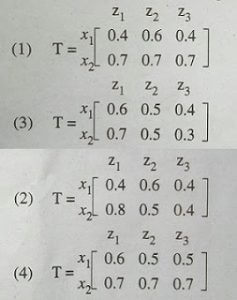
Ans: (C)
- A neuron with 3 inputs has the weight vector[0.2 -0.1 0.1]Tand a bias θ = 0. If the input vector is X = [0.2 0.4 0.2]T then the total input to the neuron is:
(A) 0.20
(B) 1.0
(C) 0.02
(D) -1.0
Ans: (C)
- Which of the following neural networks uses supervised learning?
(A) Multilayer perceptron
(B) Self organizing feature map
(C) Hopfield network
(1) (A) only
(2) (B) only
(3) (A) and (B) only
(4) (A) and (C) only
Ans: (1)
- Unix command to change the case of first three lines of file “shortlist” from lower to upper
(A) $ tr ‘[a-z]’ ‘[A-Z]’ shortlist | head-3
(B) $ head-3 shortlist | tr ‘[a-z]’ ‘[A-Z]’
(C) $ tr head-3 shortlist ‘[A-Z]’ ‘[a-z]’
(D) $ tr shortlist head-3 ‘[a-z]’ ‘[A-Z]’
Ans: (B)
- Match the following vi commands in Unix:
List-I List-II
- :w i. saves the file and quits editing mode
- 😡 ii. escapes unix shell
- :q iii. saves file and remains in editing mode
- :sh iv. quits editing mode and no changes are saved to the file
Codes:
a b c d
(A) ii iii i iv
(B) iv iii ii i
(C) iii iv i ii
(D) iii i iv ii
Ans: (D)
